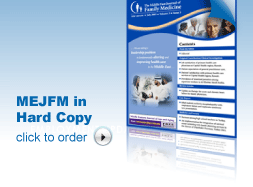|
|
 |
| ............................................................. |
|
|
| ........................................................ |
| From
the Editor |

|
Editorial
A. Abyad (Chief Editor)
|
........................................................
|
|
Original
Contribution
Abstract:
Prevalence of Anemia among Saudi children aged
6 months to 5 years in a low altitude Area,
Aseer Region, Saudi Arabia
[pdf]
Ayed A. Shati
DOI: 10.5742MEWFM.2019.93683
Abstract:
The lowest is the safest value of plasma triglycerides
[pdf]
Mehmet Rami Helvaci, Abdulrazak Abyad, Lesley
Pocock
DOI: 10.5742MEWFM.2019.93684
Population and Community Studies
Abstract:
Epidemiology of Depression Among Internally
Displaced Secondary School Students in Tikrit
[pdf]
Nariman Mohammad Ahmed, Ahmed Mahmood Younus,
Islam AR Zaradwy
DOI: 10.5742MEWFM.2019.93685
Clinical Research and Methods
Abstract:
Is there a Relation between Left Ventricular
Ejection Fraction by conventional Simpson’s
method and Systolic Myocardial Velocity by Tissue
Doppler in Heart Failure Patients?
[pdf]
Faida Ahmed Obeid
DOI: 10.5742MEWFM.2019.93686
Education and Training
Abstract:
The Role of Self-Awareness, Augmented Artificial
Intelligence and Enhanced Leadership Competencies
in Developing Future Academic Physicians
[pdf]
Mansour, N., Rafeh, W., Afram, G.,
Zaatari, G.
DOI: 10.5742MEWFM.2019.93687
Continuing Medical Education
Abdominal
wall - large ventral hernias and incisional
hernia:
(Recent developments - the use of imaging and
Botox injection)
[pdf]
Morry Brygel
|
|
Chief
Editor -
Abdulrazak
Abyad
MD, MPH, MBA, AGSF, AFCHSE
.........................................................
Editorial
Office -
Abyad Medical Center & Middle East Longevity
Institute
Azmi Street, Abdo Center,
PO BOX 618
Tripoli, Lebanon
Phone: (961) 6-443684
Fax: (961) 6-443685
Email:
aabyad@cyberia.net.lb
.........................................................
Publisher
-
Lesley
Pocock
medi+WORLD International
AUSTRALIA
Email:
lesleypocock@mediworld.com.au
.........................................................
Editorial
Enquiries -
abyad@cyberia.net.lb
.........................................................
Advertising
Enquiries -
lesleypocock@mediworld.com.au
.........................................................
While all
efforts have been made to ensure the accuracy
of the information in this journal, opinions
expressed are those of the authors and do not
necessarily reflect the views of The Publishers,
Editor or the Editorial Board. The publishers,
Editor and Editorial Board cannot be held responsible
for errors or any consequences arising from
the use of information contained in this journal;
or the views and opinions expressed. Publication
of any advertisements does not constitute any
endorsement by the Publishers and Editors of
the product advertised.
The contents
of this journal are copyright. Apart from any
fair dealing for purposes of private study,
research, criticism or review, as permitted
under the Australian Copyright Act, no part
of this program may be reproduced without the
permission of the publisher.
|
|
|
| October 2019 -
Volume 17, Issue 10 |
|
|
The Role of Self-Awareness,
Augmented Artificial Intelligence and Enhanced
Leadership Competencies in Developing Future
Academic Physicians
Mansour, N. (1)
Rafeh, W. (2)
Afram, G. (3)
Zaatari, G. (4)
(1) Executive Officer/
HR Specialist, Faculty Affairs Office, Faculty
of Medicine and Medical Center, American University
of Beirut, Lebanon
(2) Imaging Applications Manager, IT Medical
Center Processes and Systems-AUBMC, American
University of Beirut
(3) Executive Officer, Office of International
Programs, American University of Beirut
(4) Professor of Pathology and Laboratory Medicine,
Associate Dean for Faculty Affairs, Chairperson,
Department of Pathology and Laboratory Medicine,
Faculty of Medicine and Medical Center, American
University of Beirut
Corresponding author:
Nabil Mansour, CPHRC, MHRM
Executive Officer/ HR Specialist
Faculty Affairs Office, Faculty of Medicine
and Medical Center
American University of Beirut, P.O.Box 11-0236
/ Medical Dean’s Office
Riad El-Solh / Beirut 1107 2020, Lebanon
Email: nm08@aub.edu.lb
Received: August 2019; Accepted: September 2019;
Published: October 1, 2019. Citation: Mansour,
N.; Rafeh, W.; Afram, G.; Zaatari, G.. The Role
of Self-Awareness, Augmented Artificial Intelligence
and Enhanced Leadership Competencies in Developing
Future Academic Physicians. World Family Medicine.
2019; 17(10): 27-35 DOI: 10.5742MEWFM.2019.93687
|
Abstract
Providing quality and
cost-effective healthcare is a primary
objective of healthcare systems globally.
Published literature shows that healthcare
quality is greatly dependent on the wellbeing
of physicians; however, the latter has
been scarcely reported among the key performance
indicators (KPIs) of healthcare systems
and perhaps has not received the needed
attention from both healthcare systems
and physicians. Recent literature reports
that physicians’ burnout rates and
depression disorders have reached alarming
levels that necessitate immediate attention
and intervention by the healthcare systems
at large. In parallel, there is growing
evidence pertaining to the positive impact
of developing leadership qualities, self-awareness,
and embracing technology on physicians’
wellbeing and overall performance. Such
educational and training programs help
them identify their personal and professional
goals and eventually work towards achieving
them.Thus, Leadership Programs for Academic
Physicians and Scientists (LeAPS) has
been developed at the Faculty of Medicine
and Medical Center at the American University
of Beirut aiming at improving physicians’
wellbeing through developing their self-awareness,
augmented/artificial intelligence (AI)
and leadership competencies.
Key words: Augmented/Artificial
Intelligence, Self-awareness, Leadership,
Academic Physician Well-being, Burnout
|
| | |

